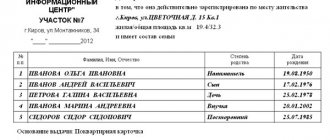35% of all state-owned apartments are privately owned . In Moscow this figure is incredibly high – 81%. However, there are still many non-privatized apartments left.
The procedure for returning housing to state or municipal ownership is also prescribed - deprivatization.
The procedure can be carried out by court decision or voluntarily , at the request of all owners. Cases of deprivatization of residential premises are no longer isolated.
What is this procedure?
As such, the concept of deprivatization (deprivatization) does not appear in legislative acts . In practice, these concepts are not equivalent and mean the following:
- Deprivatization is the return of housing to the state after previous privatization. This transfer is exclusively voluntary, based on the personal desire of the owner. After this procedure, the apartment can be provided for use on the basis of a social tenancy agreement.
- Deprivatization is the forced return of an apartment to state ownership by a court decision. That is, the contract is invalidated on the basis of a violation of the law or the procedure itself.
The reasons for deprivatization are very diverse - the reluctance of the new owner of the apartment to perform the functions of maintaining the housing, infringement of the rights of one of the owners.
Deprivatization is also relevant for apartment owners in emergency housing. By returning their property to the state, they receive hope of moving into new housing.
An apartment returned to the state no longer belongs to the owner . He will not be able to carry out any legal actions with her: sell, bequeath, exchange.
Deprivatization of residential premises is carried out under the following conditions:
- Only the owner can carry out this procedure alone;
- if there are several owners, written consent will be required from each;
- If the owners include children or disabled people, guardianship and trusteeship authorities are involved.
The following housing cannot be returned to state (municipal) property :
- inherited;
- being the object of an exchange or sale agreement;
- encumbered with a pledge or arrest;
- if after privatization tenants were registered in the apartment.
Pros and cons for homeowners
The prerequisites for deprivatization are the unwillingness or inability of the owner to fulfill certain duties assigned to him:
- Payment of property taxes. The basis for the tax is the cadastral value of the property, which increased the tax amount several times. If previously the tax was calculated based on the inventory value and amounted to a small amount, then from 2020 the tax forces some citizens to return apartments to state ownership.
- Maintenance of housing, carrying out major repairs, in particular in relation to the property of the owners of an apartment building.
- Many people use this return to obtain housing under social programs.
- In case of emergency situations - fire, flooding of neighbors - the state will compensate for damage to social housing.
There are many more disadvantages from deprivatization, primarily for the owner:
- Without being the owner of the property, you cannot sell, donate, or bequeath an apartment. Having deprivatized an apartment once, it is impossible to re-privatize the same housing.
- State property cannot be collateral, so the employer will not be able to get a large loan.
- Renting out social housing is much more difficult than renting out your own.
- The owner is deprived of the right to re-privatization, because it is given once in a lifetime.
Today, procedures for deprivatization of housing are rare, but their number is gradually increasing. This is mainly the return of apartments of cultural or historical value. Citizens resort to such a procedure extremely rarely.
Deprivatization by court is a little more common, when one of the owners files a claim for infringement of rights and restoration of justice .
Required documents
To deprivatize an apartment in 2020, the owner (or several) must submit the following documents to the department of the Housing Policy Department in the city:
- application of the established form, the form for which will be provided by the department employee;
- passports of all adult participants in the privatization of the apartment;
- title documents for real estate: transfer agreement, certificate of ownership, extract from the Unified State Register;
- a document confirming the absence of encumbrance: arrest, pledge;
- registration certificate for the apartment, issued by BTI;
- extract from the house register (certificate of registration);
- certificate of all residents living in the apartment;
- floor plan and explication of the premises;
- receipt of paid state duty.
This is the basic list, but additional information may be required :
- written consent of the person who participated in the privatization;
- power of attorney if any of the owners cannot personally participate in the procedure;
- permission from the guardianship authorities if there are children or incapacitated citizens among the owners.
The actual procedure is identical to privatization: an employee reviews the documents within a month, then an agreement is concluded with the owner on the transfer of real estate to the ownership of the municipality or state, and an agreement on social rent if the former owner continues to live in the apartment.
Deprivatization of residential premises is carried out under the following conditions
Within a month after submitting the documents, an agreement is signed between the citizen-applicant and the municipality on the transfer of the property into municipal ownership. This agreement is subject to mandatory registration with Rosreestr; one of the registered copies of the agreement remains with the former owner of the apartment. After completion of the deprivatization procedure and registration of the agreement on the transfer of the property into municipal ownership, a social rental agreement for the specified apartment must be concluded with the former owner. If the applicant is refused to accept an application for deprivatization, or after deprivatization is refused to conclude a social tenancy agreement without indicating the reasons for such refusal, the citizen has the right to go to court. Such a refusal is a direct violation of Article 9.1 of the Law of the Russian Federation of July 4, 1991 No. 1541-I “On the privatization of housing stock in the Russian Federation”, which provides for the obligation of authorized persons to take ownership of residential premises and conclude social rental agreements with citizens who have deprivatized their residential premises.
Please note => Pedagogical school and preferential teaching experience
Step-by-step instructions for deprivatization of housing
You can return your apartment to the state voluntarily or through the courts. If a claim is filed, the previously carried out privatization is declared invalid .
However, the following conditions must be met:
- only legally capable adults participated in privatization;
- the transaction was not carried out under the influence of threats or violence or pressure;
- the interests of the children were respected;
- there is a written refusal of all owners who were supposed to participate in privatization.
Deprivatization of an apartment is carried out in several steps:
- The owner collects all the necessary certificates, title documents, written consent of all privatization participants, powers of attorney if one person will carry out the procedure.
- Then he applies to the court to declare the privatization transaction invalid or to the housing policy department with a statement.
- The contract is drawn up within 2 months.
- After this, state registration of ownership of the apartment takes place, and a social rent agreement is concluded with the former owner.
The trial sometimes lasts more than two months. Re-registration of property rights in this case occurs by court decision.
The owner may be denied the procedure in the following cases:
- Since privatization, the apartment has undergone illegal redevelopment.
- One or more owners do not give consent.
- If a minor (incompetent) is registered in the apartment, deprivatization is practically impossible.
- Debt on utility bills.
- If one of the owners died after privatization and his share was inherited, the apartment cannot be returned to the state.
- If housing has been acquired under a contract of sale, exchange or inheritance, deprivatization is not carried out.
The process of deprivatization and deprivatization of an apartment: what it is and how to go through the court
If privatized housing is located in a building subject to demolition, it is more profitable to leave it in state ownership. Because then it is possible to obtain more square meters, depending on the number of residents registered in the apartment. However, after the procedure, many of them encountered some problems and realized that in some circumstances living in an apartment under a social tenancy agreement is more profitable. In this regard, the question arose about performing reverse actions , i.e. deprivatize living space.
Please note => Call a tow truck in Kotelniki for illegally parked cars
Difficulties during the procedure
The reverse privatization procedure is not prescribed by law , so many controversial issues arise in its process:
- If housing is recognized as subject to demolition or in disrepair, the legislation does not provide for the process of deprivatization in relation to such real estate. In addition, you cannot register anyone there.
- The deprivatization of apartments in military camps is prohibited. However, determining whether departmental housing will be privatized or not can be quite difficult. Litigations on this issue sometimes last for years.
- Unauthorized redevelopment carried out after privatization is fraught with additional and considerable costs: preparation of a technical plan, cadastral passport, payment of duties.
- Children registered in the apartment can also make deprivatization impossible. To do this, it is necessary to obtain permission from the guardianship authorities, which is given only if the child is looking for new housing that meets all standards. The same rule applies to disabled people.
The process of deprivatization of residential premises is quite complex, since it is necessary to take into account the rights of all owners.
If, from the moment of privatization, small children could have been registered in the apartment, one of the owners died or went to another country for permanent residence, an albeit minor redevelopment of the housing was carried out, the deprivatization process becomes more complicated
Deprivatization of residential premises is carried out under the following conditions
Deprivatization is the recognition in court of an apartment transfer agreement as invalid. When the legislation did not provide for the possibility of deprivatizing an apartment without a trial, the method of deprivatization was used. A privatization (transfer) agreement may be declared invalid on the basis of a filed claim and a court decision. To do this, it was necessary to prove in court that the privatization agreement was concluded in violation of current civil legislation. Despite the indication in Article 9.1 of the Law of the Russian Federation of July 4, 1991 No. 1541-I “On the privatization of housing stock in the Russian Federation” on the right of citizens to deprivatization, a clear definition of this concept is not given, as a result of which, during the reverse privatization procedure, the terms deprivatization are used or privatization, but there is a significant difference between these concepts.
21 Dec 2020 marketur 127
Share this post
- Related Posts
- Benefits for housing and communal services in Moscow for scientists
- Letter of compliance with the terms of the contract
- Transport tax benefit Chelyabinsk
- Land tax benefits for pensioners in Nizhnevartovsk








